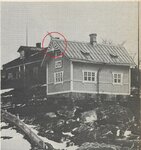- Thread starter
- #41
The Basket
Senior Master Sergeant
- 3,712
- Jun 27, 2007
What about the 2nd strike on Pearl Harbour?
Do I spell habour with or without a u?
Anyhoo 4th March 1942 was done by 2 large flying boats and was the longest bombing mission in history at that time.
Do I spell habour with or without a u?
Anyhoo 4th March 1942 was done by 2 large flying boats and was the longest bombing mission in history at that time.

